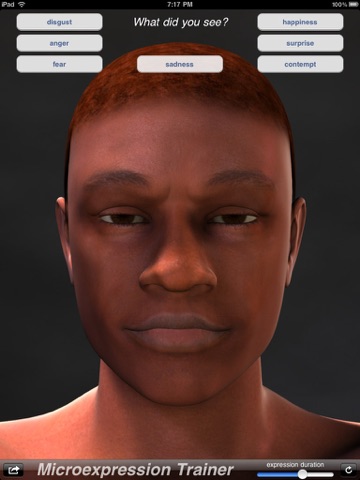

The micro-expressions usually resemble the appearances of macro-expressions (i.e., the typical or the "normal" facial expressions, which are produced when emotions occur Ekman, 2003 Hwang, 2011, 2018 Yan et al., 2013), but their durations are significantly shorter (a typical micro-expression lasts no longer than 0.5 s, while the macroexpression typically lasts between 0.5 and 4 s Hwang, 2011, 2018 Yan et al., 2013). Why this should be the case is not clear and further investigation should be carried out to determine why lowest quartile students did not benefit. But, the study did highlight that those students demonstrating good general clinical communication benefited from the training aspect of the METT, whereas low performing students did not gain. In conclusion, this pilot study showed there was no difference between the ability of medical undergraduate students assessed as being good communicators and those assessed as poor communicators to identify facial micro-expressions. The lowest quartile students showed no improvement (P = 0.799). After training, students in the high quartile showed significant improvement in the recognition of facial micro-expressions (P = 0.014). No difference in pre-assessment scores was found between the lowest and highest quartile groups (P = 0.797). Students were also invited to provide their views on the training. These students completed the METT individually, recording pre- and post-assessment scores. The sample consisted of 24 first year medical students, 9 were from the lowest performance quartile in a communication skills OSCE (Objective Structured Clinical Exam) station and 15 were from the highest performance quartile.

This pilot study investigated first year medical students' (n = 75) identified as being either good or poor communicators abilities to detect emotional micro-expressions before and after training using the Micro Expression Training Tool (METT). Many studies focus on patient verbal cues as predictors of physicians' ability to recognize and address patient needs but this project focused on non-verbal cues in the form of facial micro-expressions. Patients provide emotional cues during consultations which may be verbal or non-verbal.


 0 kommentar(er)
0 kommentar(er)
